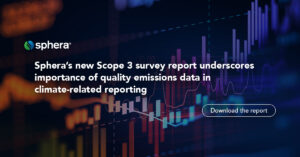
On April 22, we recognized Earth Day, which raises awareness around the health of our planet and encourages corrective action to address environmental harm. This year’s theme focuses on the effects of our reliance on plastics. There are advantages and disadvantages to many of the products we depend on today, and plastics are no exception. But you don’t have to do much digging to learn that quite a few companies are addressing the challenges related to plastics.
BASF is a great example. It has developed a bioplastic that’s made of its “ecoflex” polymer and polylactic acid, which is derived from renewable resources that are based on sugar. Advances like this one are exciting and very much in tune with Sphera’s mission to create a safer, more sustainable and productive world. But none of this can be achieved without measurable, actionable and auditable data.
Earth Day provides businesses (as well as governments and citizens) with an annual call to action, and investors, regulators and consumers are also pushing for greater corporate accountability and improved environmental performance. Failure to demonstrate this can translate into limited access to capital, noncompliance fines and penalties, or loss of revenue or reputation, so companies are rightfully taking their performance more seriously.
Where their carbon footprints are concerned, businesses can’t prove that they are progressively reducing their footprint without first establishing their baseline. So, an accurate, transparent measurement of GHG emissions is absolutely essential from the outset, and for this, high-quality data is required. Again, data is the starting point.
As a refresher, Scope 1 GHG emissions are a company’s direct emissions; Scope 2 emissions come from purchased energy; and Scope 3 emissions are the indirect emissions that come from a company’s value chain. While Scope 3 reporting represents a heavier lift, this challenge has been significantly reduced by the powerful tools that are available. Even though the SEC dropped Scope 3 from their finalized climate-related disclosure rules, many U.S. companies fall under other regulations that require information on their value chain emissions.
For instance, the Corporate Sustainability Reporting Directive, which includes Scope 3, applies to roughly 10,000 non-EU companies. The California Climate Corporate Data Accountability Act, or SB 253, applies to thousands of public and private companies, and it also mandates Scope 3 disclosures. California is the first U.S. state to require this, but it won’t be the last. In fact, large businesses around the world must work on the assumption that they will eventually need to report on Scope 3 and then develop an action plan for reducing those emissions.
To get a better sense for whether companies are prepared for this, we surveyed sustainability professionals around the world and released the findings in our recent Scope 3 Report. We learned that roughly half of the 260+ respondents voluntarily submit sustainability and ESG reports. Forty-three percent disclose their GHG emissions, and 52% of these respondents include Scope 3 emissions in their disclosures. An additional one-third plan to report their value chain emissions in the future.
When we broke these figures down by company size, we learned that 69% of large companies (those with over $1 billion in annual revenue) report across Scopes 1, 2 and 3. Larger companies may have more resources and stronger reporting capabilities, but new solutions are making it easier for organizations to quantify and report their Scope 3 emissions, even if they lack the resources that larger enterprises have. Integrated technology solutions are the answer.
At Sphera, we are fully engaged in understanding and addressing the Scope 3 reporting challenges that businesses face. Our Integrated Sustainability solution is a product of this ongoing effort. It enables companies to manage all aspects of emissions measurement and ESG reporting with components that include:
- Corporate Sustainability for compliance and reporting.
- Environmental Accounting for efficient air, water and waste tracking and management.
- Supply Chain Sustainability for actionable vendor assessments.
- Supply Chain Risk Management for stronger risk mitigation.
- Life Cycle Assessments for understanding the environmental impacts of products and entire product portfolios.
- Managed Emissions Factor Data for accurate emissions measurement.
We are excited to offer this solution in a period of increasing regulatory activity and growing stakeholder demands for sustainability and ESG reporting. We’re also proud to report that our SpheraCloud Integrated Sustainability solution recently received a Top Product of the Year Award in the Environment+Energy Leader Awards program. This award speaks to the urgent need for solutions that equip businesses for reporting that’s based on sound, defensible data.
Earth Day reminds us that businesses need to participate in improving the health of the planet, and they need innovations in technology and access to data to do this. If their sustainability initiatives are successful, it’s our youngest citizens who will benefit the most because they’ll inherit a cleaner, healthier planet. I can’t think of a better reason to engage in this effort.
–Paul
Learn more about Paul Marushka.
Why environmental accounting software is a game changer in high-emitting industries


